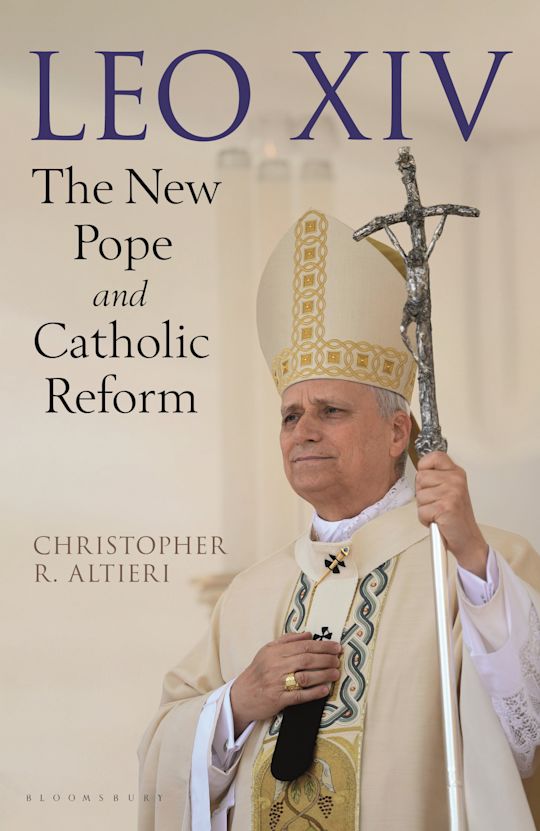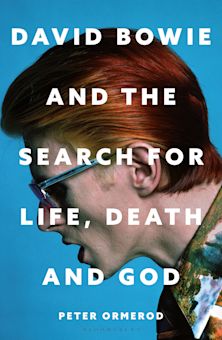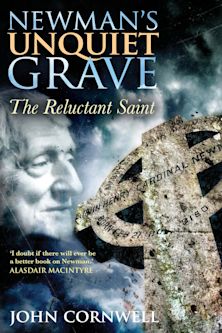You must sign in to add this item to your wishlist. Please sign in or create an account
Description
When Robert Francis Prevost OSA appeared on the loggia of St. Peter's on 8th May 2025, he surprised the world.
The first North American pope is a quiet man few had heard of, following the legacy of one the most media savvy pontiffs in history. Yet with subtle gestures, Pope Leo has shown that he is a bridge-builder, a man willing to unite the factions in a deeply divided Church.
In this comprehensive book which joins biography with critical examination of the state of the Church, veteran journalist Christopher R. Altieri explores Prevost's life and work, from his early years in Chicago to his ministry in Peru, and how he came to be chosen as leader of the world's 1.4 billion Catholics.
Altieri provides insight into the politics of the 2025 conclave, alongside Pope Leo's choice of papal name, and the major challenges and deep-rooted problems of the Church that he now must run – and all at a time when the world is asking big questions about what it means to be human in a complex ethical world of AI and global conflict.
Through this Pope Leo emerges as a quiet man of true humility, with a track record as an efficient administrator and conciliatory figure, whose background in Canon Law might just offer him the skills needed to govern and reshape the modern Church.
Table of Contents
Chapter 1: A radical choice
Profile of a pope
Pope Leo: What happened?
The Challenge of Reform
What reform looks like
No “Golden Age”
Chapter 2: A restless heart
(Extra)ordinary beginnings
Cerca y personal: Augustinian, missionary, prior
Prior general, bishop, cardinal
The hand of providence
Chapter 3: “Peace be with all of you.”
Radically moderate
The power-and limits-of gestures and signs
Strange bedfellows: The College of Cardinals in brief
The conclave of May 2025 in context
Vicar of Christ: The man and the office
Chapter 4: An Augustinian pope
Power and order in the Augustinian mind
One commonwealth of all Christians: In illo uno unum
Journeying together
Pope Leo XIV: Two keys to understanding
Human nature and power in society: an Augustinian view
Citizen and stranger
Augustinian optimism
Chapter 5: A Lion of springtime
Technological eclipse
Worse (and also better)
Attention deficit
How the Church communicates
Leo XIV and the “culture of encounter”
From the personal to the institutional – continuities and discontinuities
Interlude: The State of the Vatican (and the state of the Church)
Reform “on the go”
Teaching and governance: Fernández in the DDF
In form for action(?): The Church on the international stage
The Church's shifting centre of gravity
Things come to a head: Fiducia supplicans
Unsustainable: Vatican finances in crisis
Looking forward: The papal in-tray
Chapter 6: Communications, curial culture, Synodality
The challenge of reform: Vatican Communications
Communication as listening: “Synodality” and the Synod of Bishops
Romanitas
Institutional memory
In short
Chapter 7: Financial reform
Misconceptions
Peter's Pence: Myth, facts, conjecture
Signs of the times
A threefold challenge for Pope Leo XIV
A long time coming
The bottom line
Chapter 8: Reform of justice
Leo XIV: Unfinished business
Justice in a fallen world
Practical challenges: Justice as closeness to victims
The requirements of natural justice
Natural justice and judicial independence
Reserve powers
The conciliarist controversy and its aftermath
Chapter 9: The nature and limits of papal governing power
Governing power as such
Justice in the ecclesiastical system
Twin challenges: transparency and judicial independence
Secretly untenable
What could Pope Leo XIV do?
Preliminary indications: theory and practice
An investigative arm
A Matter for the Synod of Bishops?
Making the pallium mean something (again)
Conclusion: Drivers of crisis
Notes
Product details
| Published | 02 Oct 2025 |
|---|---|
| Format | Ebook (PDF) |
| Edition | 1st |
| Extent | 224 |
| ISBN | 9781399430845 |
| Imprint | Bloomsbury Continuum |
| Publisher | Bloomsbury Publishing |
About the contributors
Reviews
-
Chris Altieri is a provocative and passionate writer, with views forged by decades of experience and a deeply original intelligence. He's never been better than he is here, as he plumbs the early promise of the papacy of Leo XIV, from the tri-cultural character of the new pope's formation to his roots in a distinctly Augustinian spirituality. While it's all compelling, read Alteri especially on the looming challenges of institutional reform – which, as ever, is where the rubber truly meets the road. This is essential reading, not only on the pope but on the church in our times.
John L. Allen Jr, Editor-in-Chief, Crux
-
I've long regarded Altieri as the most incisive of Vatican watchers. This book, tackling a critical topic in a readable way, is yet further proof that I'm right.
Stephen Bullivant, Professor of Theology and Sociology, St Mary's University (UK) and University of Notre Dame (Australia)
-
Christopher Altieri offers more than insight into the background and thinking of Pope Leo, as important as that is. In lucid, balanced prose, he provides a cogent, honest, wise analysis of the situation of the Church in this present moment in a way that few other authors are managing right now: grounded in the historical, theological and spiritual realities of the Church as it is and as it is called to be in this broken world, so needful of the Gospel, clearly proclaimed and confidently – and competently – shared.
Amy Welborn, writer and former correspondent Our Sunday Visitor
-
Few journalists can match Christopher R. Altieri's depth of knowledge about the Vatican and the Catholic Church. In this timely and incisive book, he draws on first-hand experience with Church institutions and leadership, alongside academic expertise in political philosophy and a profound historical sensitivity, to offer a compelling portrait of Pope Leo XIV-the first U.S.-born pontiff. Tracing Leo's path from Augustinian missionary to curial insider, Altieri examines the challenges he inherits from Pope Francis and the complex task of governing a global Church. This is a sharp, authoritative look at the early days of a pivotal pontificate and what lies ahead.
Francis X. Rocca, former Vatican correspondent, The Wall Street Journal
-
This book is among the very first to try to encompass what the advent of Leo XIV means in general terms… Altieri…is significantly well equipped to write it… A mine of useful insight.
The chapters are clearly written and presented, there are many equally important matters and insights to be found in the very detailed notes which take up a third of the book. In these pages there is as much food for thought as there is in the main text.
The Irish Catholic

































